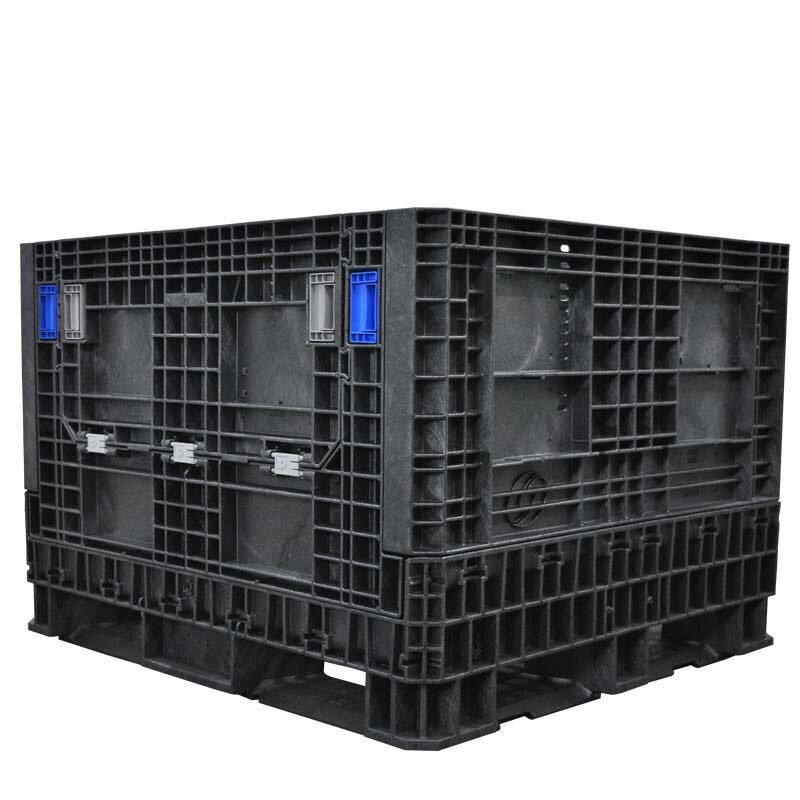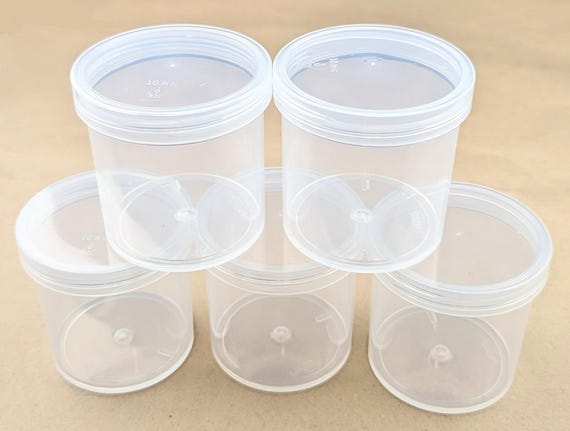Discover smart ways to use Bulk Plastic Containers in industrial settings
Wiki Article
The Role of Mass Plastic Containers in Effective Recycling Practices and Sustainability
Bulk plastic containers are indispensable to modern recycling initiatives. Their layout improves the effectiveness of material collection and transportation, contributing to sustainability objectives. These containers not only maximize area yet also help in keeping track of contamination levels. Nevertheless, their application is not without difficulties. Understanding the full extent of their effect exposes a complicated connection between logistics and environmental duty that warrants additional exploration.Recognizing Mass Plastic Containers
Bulk plastic containers function as an essential element in different sectors, helping with the storage and transport of products. These containers are typically made from robust materials such as high-density polyethylene (HDPE) or polypropylene, which offer durability and resistance to ecological aspects. Their design typically includes attributes like stackability and modularity, enabling for effective use space throughout both storage space and transportation.Industries such as agriculture, food handling, and making regularly utilize bulk plastic containers as a result of their light-weight nature and convenience of handling. The containers come in numerous sizes and setups, accommodating the certain requirements of different items. Their adaptability extends beyond plain functionality; they can also be tailored with covers, takes care of, and classifying choices to enhance use - Bulk Plastic Containers. Therefore, bulk plastic containers play an important role in optimizing logistics and supply chain procedures throughout numerous sectors, thus adding to overall performance and cost-effectiveness
Benefits of Making Use Of Mass Plastic Containers in Recycling
When companies focus on reusing initiatives, the usage of mass plastic containers significantly enhances the performance of the process. These containers are made to enhance space, permitting for the storage space and transport of bigger quantities of recyclable products. This results in less journeys to recycling facilities, thus lowering gas intake and connected exhausts.Additionally, mass plastic containers are resistant and durable to various ecological factors, guaranteeing that materials stay safeguarded during handling and transit. Their lightweight design better adds to lower transportation prices.
The uniformity of these containers facilitates better sorting and handling of recyclable products, which can improve total recycling rates. Organizations that take on bulk plastic containers also demonstrate a commitment to sustainability, favorably influencing their brand picture. Ultimately, these advantages not only enhance recycling practices but also add to broader environmental goals
Exactly How Mass Plastic Containers Facilitate Product Collection
Efficient material collection is greatly enhanced by the use mass plastic containers, as they provide a reliable and organized option for gathering recyclable items. These containers are made to suit large volumes of materials, which simplifies the sorting and storage procedure. Their stackable layout takes full advantage of room utilization, making it much easier for centers to arrange recyclables without mess.Furthermore, mass plastic containers are weather-resistant and durable, enabling exterior placement without destruction. This durability guarantees that materials continue to be secured until they are gathered for processing.

The harmony in shapes and size of these containers helps with standardization across collection points, allowing much better tracking of recyclable quantities. Furthermore, their transparent nature permits very easy presence of contents, aiding in the monitoring of contamination levels and ensuring that only ideal products are accumulated. In general, mass plastic containers play an essential duty in improving the material collection procedure, consequently advertising reliable recycling practices.
Transportation Efficiency and Environmental Impact
Transportation efficiency plays an important role in the reusing procedure, especially through the optimization of lots capacity wholesale plastic containers. By making the most of the quantity of material transported, firms can greatly decrease the number of journeys needed, therefore decreasing their carbon footprint. This approach not only improves operational performance however likewise adds to extra lasting ecological methods.
Optimizing Tons Capacity
Enhancing load ability is frequently ignored, it plays an essential duty in boosting transport effectiveness and decreasing ecological effect in reusing methods. By optimizing the quantity that mass plastic containers can hold, recycling operations can lower the variety of journeys required for transport. This not only reduces fuel usage however likewise decreases the wear and tear on cars. Reliable lots management allows facilities to utilize space properly, making sure that each transport cycle is as efficient as feasible. In addition, well-optimized tons can cause far better arrangements with logistics suppliers, potentially reducing general expenses. Eventually, enhancing load capacity adds to an extra sustainable recycling system by fostering reliable source usage and reducing waste produced during transportation.Lowering Carbon Impact
As reusing operations undertaking to reduce their ecological influence, minimizing the carbon impact connected with transportation arises as a critical objective. Bulk plastic containers play a crucial function in attaining this goal by improving tons efficiency and enhancing logistics. Their light-weight yet long lasting style allows for optimum cargo room application, reducing the variety of trips needed to carry products. By consolidating deliveries, reusing centers can decrease fuel consumption and greenhouse gas exhausts. Additionally, purposefully situating recycling facilities minimizes transportation distances, additionally decreasing carbon outputs. Using fuel-efficient lorries and alternate power resources enhances overall sustainability. By incorporating these methods, the reusing market can considerably reduce its carbon footprint, adding to an extra lasting future.Obstacles in making use of Bulk Plastic Containers

Contamination Concerns
Contamination problems stand for a substantial obstacle in the efficient use of bulk plastic containers within reusing techniques. These containers usually gather residues from previous materials, leading to mixed products that can prevent the recycling procedure. Impurities such as food waste, chemicals, or non-recyclable materials can jeopardize the stability of the entire batch, causing increased disposal costs and decreased reusing prices. Additionally, improper cleansing or sorting can worsen these issues, making it challenging for reusing helpful resources facilities to process materials efficiently. The existence of pollutants not just influences the top quality of recycled products yet also undermines the general sustainability efforts intended at lowering plastic waste. Dealing with these contamination difficulties is critical for boosting the efficiency of mass plastic container recycling.Recycling Framework Limitations
Inadequacy in reusing facilities positions significant difficulties for the reliable monitoring of bulk plastic containers. Several reusing facilities do not have the capability to refine large volumes of these containers effectively, resulting in boosted costs and delays. Insufficient arranging technologies commonly lead to contamination, as mass containers may be mixed with various other materials, making complex the recycling process. Minimal transportation alternatives also prevent the activity of mass plastic containers to ideal reusing centers, causing raised landfill waste. In addition, a lack of standardized procedures for bulk container reusing develops complication among companies and consumers, better complicating initiatives to promote sustainability. Resolving these infrastructure restrictions is vital to boost recycling methods and make the most of the capacity of bulk plastic containers in a circular economy.Finest Practices for Carrying Out Bulk Plastic Containers
When organizations consider carrying out bulk plastic containers in their recycling techniques, they ought to focus on a tactical method that boosts performance and lowers contamination dangers. Initially, picking the suitable container dimension and kind is necessary to suit the quantity of products being processed. Organizations needs to additionally develop clear labeling and signage to guide users on correct disposal methods, reducing complication and errors. Routine training sessions for personnel can even more reinforce these techniques, guaranteeing everybody understands their functions in preserving recycling integrity.
Additionally, companies need to execute a routine maintenance routine to check and clean containers, preventing the build-up of contaminants. Partnering with neighborhood recycling centers can also improve the collection process, guaranteeing that materials are successfully refined. Finally, companies ought to check and review their reusing metrics, using this data to refine methods hop over to these guys over time and advertise continuous renovation in their sustainability initiatives.
The Future of Mass Plastic Containers in Sustainable Practices
As organizations progressively prioritize sustainability, the role of mass plastic containers in recycling techniques is set to evolve considerably. Innovations in products science are leading to the advancement of recyclable and naturally degradable options, boosting the environmental benefits of mass plastic containers. In addition, the implementation of closed-loop systems will permit for simpler collection and repurposing of these containers, reducing waste and resource intake.Technological advancements, such as wise radar, will allow firms to monitor the lifecycle of mass containers, enhancing efficiency in recycling procedures. As consumer need for sustainable techniques grows, companies will likely take on mass plastic containers designed for reuse and lasting worth. Partnership between markets and governments will promote the facility of standardized recycling methods, guaranteeing that bulk containers are properly incorporated right into wider sustainability campaigns. Generally, the future of bulk plastic containers shows up encouraging, with significant possibility for contributing to a round economic climate.
Regularly Asked Inquiries
How Are Mass Plastic Containers Made and What Products Are Utilized?
Mass plastic containers are usually made from high-density polyethylene (HDPE) or polypropylene (PP) These products are refined via shot molding or strike molding strategies, causing resilient, lightweight containers ideal for different storage space and transportation needs.
Can Mass Plastic Containers Be Reused Several Times Before Recycling?
Yes, bulk plastic containers can be reused several times prior to recycling. Their toughness and design enable duplicated usage in different applications, promoting sustainability and source effectiveness while minimizing the need for new containers.
What Certifications Exist for Bulk Plastic Containers in Recycling?
Different qualifications for bulk plastic containers consist of the Recycling Collaboration's qualification, the Cradle to Cradle Qualified ™ criterion, and the Lasting Product packaging Union's standards, guaranteeing containers satisfy certain ecological and recyclability criteria for reliable recycling.How Do Mass Plastic Containers Compare to Other Recycling Storage Options?
Mass plastic containers provide better longevity and ability contrasted to other reusing storage options, decreasing the danger of contamination and promoting efficient transportation. Their design sustains better organization, improving total efficiency in recycling operations.What Is the Life-span of a Bulk Plastic Container in Recycling Processes?
The lifespan of a bulk plastic container in recycling processes normally varies from 5 to one decade, depending my blog on use, worldly top quality, and ecological problems, permitting for multiple cycles of use before eventual disposal or recycling.When organizations focus on reusing initiatives, the use of bulk plastic containers substantially improves the performance of the procedure. Transport performance plays an important function in the reusing process, specifically with the optimization of lots capacity in bulk plastic containers. The use of mass plastic containers in recycling methods encounters substantial difficulties, especially worrying contamination concerns and restrictions within reusing framework. Contamination issues stand for a significant difficulty in the reliable use of bulk plastic containers within reusing practices. When organizations consider applying mass plastic containers in their recycling techniques, they should focus on a tactical technique that enhances effectiveness and decreases contamination risks.
Report this wiki page